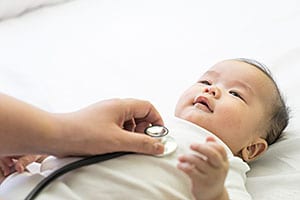Respiratory Syncytial Virus Infection (RSV)
reference and copy from : https://www.cdc.gov/rsv/about/symptoms.html
Respiratory syncytial (sin-SISH-uhl) virus, or RSV, is a common respiratory virus that usually causes mild, cold-like symptoms. Most people recover in a week or two, but RSV can be serious, especially for infants and older adults.
RSV is the most common cause of bronchiolitis (inflammation of the small airways in the lung) and pneumonia (infection of the lungs) in children younger than 1 year of age in the United States.
Symptoms

People infected with RSV usually show symptoms within 4 to 6 days after getting infected. Symptoms of RSV infection usually include
- Runny nose
- Decrease in appetite
- Coughing
- Sneezing
- Fever
- Wheezing
These symptoms usually appear in stages and not all at once. In very young infants with RSV, the only symptoms may be irritability, decreased activity, and breathing difficulties.
Almost all children will have had an RSV infection by their second birthday.
However, repeat infections may occur throughout life, and people of any age can be infected. Infections in healthy children and adults are generally less severe than among infants and older adults with certain medical conditions. People at highest risk for severe disease include
- Premature infants
- Young children with congenital (from birth) heart or chronic lung disease
- Young children with compromised (weakened) immune systems due to a medical condition or medical treatment
- Children with neuromuscular disorders
- Adults with compromised immune systems
- Older adults, especially those with underlying heart or lung disease
In the United States and other areas with similar climates, RSV circulation generally starts during fall and peaks in the winter. The timing and severity of RSV circulation in a given community can vary from year to year.
People infected with RSV are usually contagious for 3 to 8 days and may become contagious a day or two before they start showing signs of illness.
Call your healthcare professional if you or your child is having difficulty breathing, not drinking enough fluids, or experiencing worsening symptoms.
RSV can cause more serious health problems
RSV can also cause more severe infections such as bronchiolitis, an inflammation of the small airways in the lung, and pneumonia, an infection of the lungs. It is the most common cause of bronchiolitis and pneumonia in children younger than 1 year of age.
Healthy adults and infants infected with RSV do not usually need to be hospitalized. But some people with RSV infection, especially older adults and infants younger than 6 months of age, may need to be hospitalized if they are having trouble breathing or are dehydrated.
In the most severe cases, a person may require additional oxygen, or IV fluids (if they can’t eat or drink enough), or intubation (have a breathing tube inserted through the mouth and down to the airway) with mechanical ventilation (a machine to help a person breathe). In most of these cases, hospitalization only lasts a few days.
Learn more about people at high risk for severe RSV infection.
Prevention
Ways to help stop RSV from spreading
RSV Prevention
There are steps you can take to help prevent the spread of RSV. Specifically, if you have cold-like symptoms you should
- Cover your coughs and sneezes with a tissue or your upper shirt sleeve, not your hands
- Wash your hands often with soap and water for at least 20 seconds
- Avoid close contact, such as kissing, shaking hands, and sharing cups and eating utensils, with others
- Clean frequently touched surfaces such as doorknobs and mobile devices
